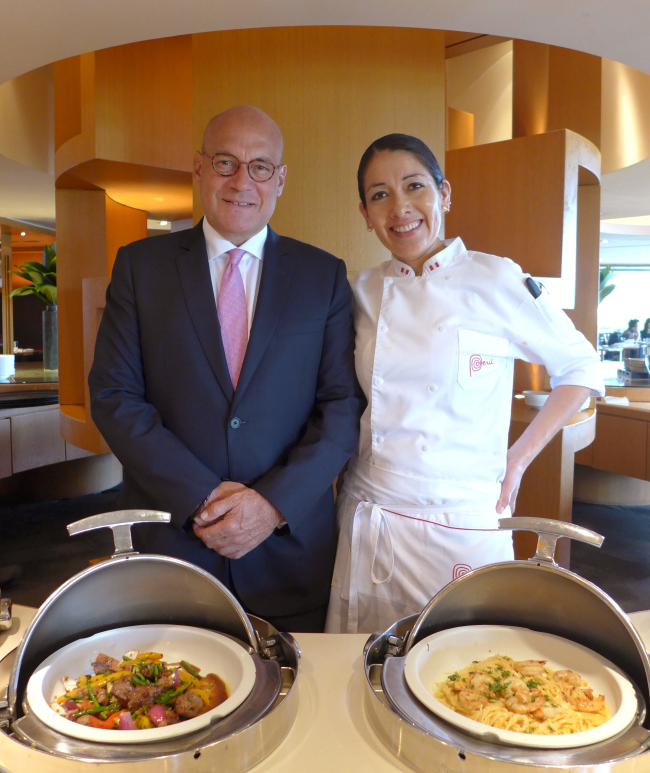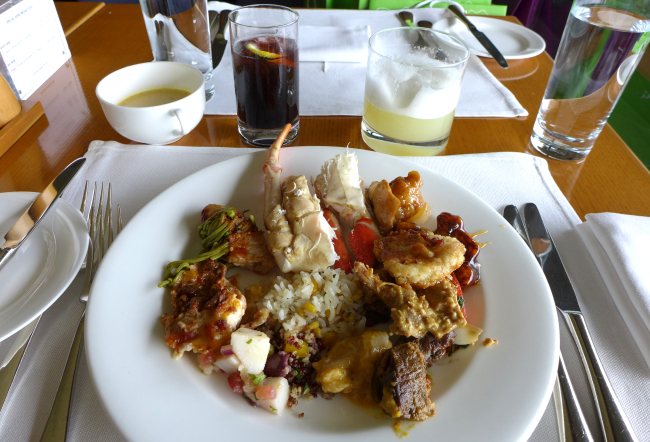Peruvian cuisine, famous for its diversity and creativity, has come to the fore of international attention in recent years, abetted by experimental efforts and proactive promotion.
Eight Peruvian restaurants were listed last year in a list of Latin America’s 50 best restaurants sponsored by mineral water brand Acqua Panna S. Pellegrino, and two were included in its list of the top 50 in the world.
Peru’s disparate ecosystem, biodiversity and climate from the Pacific Ocean, Lake Titicaca, Andes Mountains, Amazon Forest and coastal deserts produce a full plate of ingredients capable of concocting a tableful of flavors.
Centuries of European, Asian and African immigration have added new livestock, grains and techniques to the nation’s food culture.
 |
| Peruvian Ambassador Jaime Pomareda (left) and Peruvian chef based in Shanghai, Maria Rosa Vasquez, pose at The Terrace Restaurant of the Grand Hyatt Seoul on Friday. Joel Lee / The Korea Herald |
A variety of traditional and fusion Peruvian dishes are available for the third straight year at The Terrace Restaurant of the Grand Hyatt Seoul from July 15-28.
Among the dishes presented are ceviche, a raw fish salad marinated in lemon juice and onions; causa limena, stuffed potato patties with chicken; marinated octopus with olive sauce and chili; quinoa salad with mushrooms and nuts; Peruvian fish soup; roasted pork belly and marinated pork leg; sauteed beef tenderloin; duck leg and pork stew with rice and lentils; and spaghetti with prawns and yellow pepper.
For desserts, Peruvian donuts and puddings are showcased, and for beverages, the restaurant offers a purple corn soft drink, chicha morada, and a cocktail made of lime juice, syrup and egg white called pisco sour.
 |
| A plate of assorted Peruvian dishes available at The Terrance Restaurant of Grand Hyatt Seoul. Joel Lee / The Korea Herald |
“There has been a food revolution in Peru in the last 15 years,” Peruvian Ambassador Jaime Pomareda told The Korea Herald. “Local chefs have become promoters and innovators of creative recipes, infusing traditional and modern methods from different continents.”
Thanks to Peru’s growing international engagement through tourism and commerce, the traditional dishes – once regarded as rough peasant food – are being revived as “haute entrees.”
Many Peruvian chefs have incorporated European techniques into their approaches, supplied by fresh, locally sourced ingredients, such as Andean tubers, Amazonian fish, Altiplano herbs and tropical fruits.
Capital Lima has become Latin America’s culinary epicenter over the years, with restaurants topping international charts. As a trendy culture, food and drink destination, the city offers surprises for the hungry mouths and gourmet tongues alike.
Rice is a staple diet of Peruvian cuisine, a legacy of Chinese immigration from 170 years ago. Peruvians eat the most amount of rice compared to other South Americans, the ambassador explained.
“Peruvians love their cuisine so much that the national sport is food rather than soccer,” embassy counsellor Enrique Cardenas Arestegui highlighted. “We love soccer. But if we had to choose between food and soccer, no need to think. Food.”
Pomareda said, “We try to combine the joy of soccer and food together at cafes, restaurants and bars — popular hangouts.”
Peruvian restaurants are becoming increasingly popular in Tokyo, Hong Kong, Singapore, Beijing and Shanghai, as well as Europe and America. Four are in Korea – Cusco in Seoul, Sabor Peruano in Osan, Gyonggi Province, Machu Picchu and Sabor Latino in Dongducheon, just north of Seoul.
By Joel Lee (joel@heraldcorp.com)



